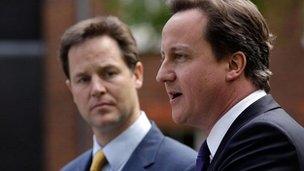Political parties seek to woo future Essex voters
- Published
- comments

The main political parties have been in Essex to woe voters and look ahead to future challenges
What do the party leaders do when politics has reached a watershed moment?
They go to Essex.
With last week's local election results ringing in their ears David Cameron (40 seats lost in the East) and Nick Clegg (who lost a quarter of Lib Dem seats here) chose Basildon as the place to renew their coalition vows.
On the same day, Ed Miliband (54 gains across the East) decided that Harlow, back in Labour control for the first time in 10 years, was the place to be.
It reminded us how important Essex man and woman are to the political parties.
'Essex man'
Ever since David Amess' victory in Basildon in 1979, the county has been a key political barometer.
All the parties recognise that they need to capture the support of the hard working and aspirational people of Essex to be in with a chance of running the country.
After last week's results, which saw Labour make big gains in Basildon and Harlow, there is a feeling that Essex man and woman are getting restless.
"Essex man wants delivery," says Professor Paul Whiteley from the University of Essex, external.
"He wants the government, whether on the left or the right, to deliver on the things that matter to him, and the things he cares about most are personal security and the economy."
"The economy is the most important thing at the moment, and at the moment Essex man feels the government has not got to grips with the economy."
That's probably why Downing Street chose the CNH tractor factory in Basildon for the coalition relaunch.
The county's only tractor manufacturer, it builds 26,000 tractors a year and sells in 120 countries.
With machines rolling off the production line behind them, both David Cameron and Nick Clegg had the perfect backdrop to declare that their priority would remain sorting out the economy.
That, in turn, would create jobs and boost manufacturing.
Optimistic future?
"The need for a coalition is as great as ever," said the Prime Minister, external, as he promised to create more apprenticeships and keep down interest rates.
"The important thing is to do the right thing... to look at the long term picture and not the next day's headlines."
Cameron and Clegg 'relaunch coalition'
The Liberal Democrat Deputy Prime Minister said the factory was amazing.
"I'm genuinely optimistic for the future of this country," Nick Clegg, external told staff.
"I think we have undersold our strength as a manufacturing power."
Ed Miliband, external, on the other hand, was promising to listen more, while he tried to reach an audience of Essex men and women in Harlow.
"Essex always used to be the place of aspiration but that aspiration is now being blunted," he said.
The Labour leader told them there was a crisis in politics and pointed to the fact that 71% of people in Essex didn't vote last week as a sign that people had lost faith in politicians.
Mr Miliband wanted to be different.
Labour keep talking about paying more attention to the Eastern region following what's generally accepted to have been many years of neglect.
Labour gains
But Professor Whiteley says our region will never be natural Labour territory.
"They won back a lot of their old haunts this year; Harlow, Norwich and Great Yarmouth.
Ed Miliband admitted Labour had not done enough when it was last in government
"Next time they'll take a shot at Cambridge (now in no overall control) and probably Colchester too but there are not many natural Labour places in the East."
"They won't make the region a high priority in terms of campaigning.
"Their main concern is the West Midlands and the North where there are more marginals."
But he adds, never underestimate the importance of Essex man and woman.